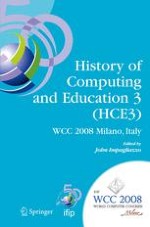These proceedings derive from an international conference on the history of computing and education. This conference is the third of hopefully a series of conferences that will take place within the International Federation for Information Processing (IFIP) and hence, we describe it as the “Third IFIP Conference on the History of Computing and Education” or simply “History of Computing and Education 3” (HCE3). This volume consists of a collection of articles presented at the HCE3 conference held in association with the IFIP 2008 World Computer Congress in Milano, Italy. Articles range from a wide variety of computing perspectives and they represent activities from six continents. The HCE3 conference is an event of the IFIP Working Group 9.7 on the History of Computing, a working group of IFIP’ s Technical Committee 9 (TC9) on the Relationship between Computers and Society. In addition, it is in cooperation with the IFIP Technical Committee 3 (TC3) on Education. The HCE3 conference brings to light a broad spectrum of issues. It illustrates topics in computing as they occurred in the “early days” of computing whose ramifications or overtones remain with us today. Indeed, many of the early challenges remain part of our educational tapestry; most likely, many will evolve into future challenges. Therefore, these proceedings provide additional value to the reader as it will reflect in part the future development of computing and education to stimulate new ideas and models in educational development.
